| Srl | Item |
| 1 |
ID:
177749
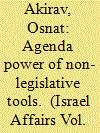

|
|
|
|
|
| Summary/Abstract |
How do we assess the power of governments to control and set the agenda in parliaments? How do we assess the power of oppositions to present their agenda? Cox and McCubbins’ cartel model used a roll rate analysis of legislation, while Krehbiel suggested the use of non-legislative tools. Based on this advice, this article investigates the use of a non-legislative tool – motions for the agenda – in the Israeli Knesset, or more specifically: ‘the agenda power of non-legislative tools’ defined as the ability to block or significantly delay motions from reaching a debate in committee. Using data from the Knesset, in which the opposition operates in a parliamentary system with multiparty coalition governments, it demonstrates that opposition legislators utilise these non-legislative tools more extensively than coalition members to wield their agenda power. The findings support the addition of this tool to the cartel model.
|
|
|
|
|
|
|
|
|
|
|
|
|
|
|
|
| 2 |
ID:
177745
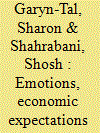

|
|
|
|
|
| Summary/Abstract |
Using data from a field study conducted among soldiers during the 2014 Protective-Edge military operation (OPE) in the Gaza Strip, this article examines the effect of exposure to war on soldiers’ emotions, economic expectations, and willingness to take risks. The results suggest that combat soldiers who took part in OPE were more willing to take risks and more optimistic. The analytical results indicate that among combat soldiers, levels of negative emotions were negatively related to individual economic expectations, while being present in the staging area close to OPE significantly and positively affected the level of their economic expectations.
|
|
|
|
|
|
|
|
|
|
|
|
|
|
|
|
| 3 |
ID:
177741
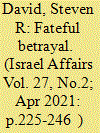

|
|
|
|
|
| Summary/Abstract |
In order to pressure Israel to withdraw from the lands it took following the 1956 Suez War, the United States made two key commitments. It promised Israel it would open the Straits of Tiran if Egypt reimposed a blockade and that if the blockade nevertheless persisted, Israel would have the right to act on its own to ensure free passage of Israeli ships. When Nasser closed the Straits in 1967, President Johnson reneged on both commitments. LBJ chose not to act to end the blockade and warned Israel not to act alone. The failure to live up to these commitments contributed to the outbreak of the 1967 War, hampered efforts to get Israel to give up the territories it conquered as a result of the war, and reinforced in Israel the conviction that it could not depend on others for its security. Israel and the Middle East would be very different places today if those commitments had been fulfilled.
|
|
|
|
|
|
|
|
|
|
|
|
|
|
|
|
| 4 |
ID:
177748


|
|
|
|
|
| Summary/Abstract |
This article examines the extent to which the Sister Cities program affects local tourism in Israel. We split sister cities’ coupling methods into four categories according to the populations of the foreign and local cities and found that the most beneficial coupling method, in terms of the number of tourists and the length of time they spend in Israel, was the same sizes method (Big-Big and Small-Small), with an emphasis on Big-Big, which was found to be the best coupling method. The findings show that culture, religion and common ideology have an important influence on tourism.
|
|
|
|
|
|
|
|
|
|
|
|
|
|
|
|
| 5 |
ID:
177747
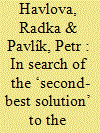

|
|
|
|
|
| Summary/Abstract |
This article presents an alternative approach to the resolution of the Palestinian-Israeli conflict. As the one-state solution is generally unacceptable to both Israel and the Palestinians and the two-state solution does not seem to be working, the authors suggest a possible ‘second-best solution’. Under this proposal a prospective Palestinian state would extend from the Gaza Strip to adjacent parts of the Sinai Peninsula for which Egypt would receive either financial or territorial compensation by the extension of its territory westwards to areas currently administered by Libya.
|
|
|
|
|
|
|
|
|
|
|
|
|
|
|
|
| 6 |
ID:
177742


|
|
|
|
|
| Summary/Abstract |
This article discusses the declared policy of the Ministry of Education regarding teacher training over seven decades, and examines the ways teacher training institutions have dealt with its implementation and the attendant educational, policy, and professional problems. The central thesis is that these fundamental issues were created and continue to exist because of the dual (and often contradictory) policy of the Ministry of Education and the discrepancy between the declared goals and their actual implementation.
|
|
|
|
|
|
|
|
|
|
|
|
|
|
|
|
| 7 |
ID:
177746
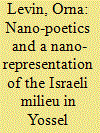

|
|
|
|
|
| Summary/Abstract |
This article discusses the unique nano-poetics and its nano-representation of the Israeli milieu, as found in Yossel Birstein’s short-short bus-stories. While these stories demonstrate the author’s poetics, they also constitute a miniature replica of Israeli society, emphasising the following four major aspects of this society: (1) the tension between the Jewish past and the Israeli present; (2) the complex dynamics between private and public life; (3) the gap between newcomers and veteran immigrants; and (4) a mentality dominated by nervous tension combined with the unique form of audacity known as chutzpah. Birstein presents the bus both as the inspiration for and as the object of his writing, and this narrative framework showcases the many variants in Israeli culture.
|
|
|
|
|
|
|
|
|
|
|
|
|
|
|
|
| 8 |
ID:
177743


|
|
|
|
|
| Summary/Abstract |
This article examines the role played by rural schools in forging the Israeli identity of immigrant children in the new villages during he 1950s and 1960s. The modus operandi of these schools is interesting due to the nature of these communities and to the role of the ethos of the rural way of life in the Zionist narrative. An important education device the schools implemented was the enacting of celebrations, involving the entire community. Thus, the schools played a major role in shaping local cultural traditions, defined by boundaries of time and space for the pupils and their families.
|
|
|
|
|
|
|
|
|
|
|
|
|
|
|
|
| 9 |
ID:
177744


|
|
|
|
|
| Summary/Abstract |
This article seeks to analyse the political behaviour of the Arab sector in Israel in the three rounds of general elections held between April 2019 to March 2020. In the first round (April 9), despite high expectations within the Arab sector of seeing a joint Arab list competing in the elections for the 21st Knesset, the joint list was dismantled. Arab voters expressed their disappointment and stayed away from the ballot box. The political result was a decline from 13 to 10 parliamentary seats. In the second round (September 17) the joint list was reunited and won 13 seats again. In the third round (March 2020) it won 15 seats after competing yet again as a joint party. These experiences show that boycotting the elections harms the Arab minority while combining all political parties brings greater political influence.
|
|
|
|
|
|
|
|
|
|
|
|
|
|
|
|